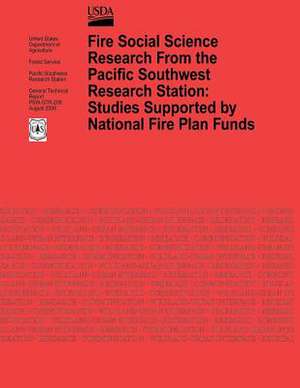Fire Social Science Research from the Pacifc Southwest Research Station
Autor U. S. Department of Agriculture, Forest Service Editat de Deborah J. Chavezen Limba Engleză Paperback
Preț: 169.65 lei
Nou
Puncte Express: 254
Preț estimativ în valută:
32.46€ • 33.98$ • 27.02£
32.46€ • 33.98$ • 27.02£
Carte disponibilă
Livrare economică 10-24 martie
Preluare comenzi: 021 569.72.76
Specificații
ISBN-13: 9781480146273
ISBN-10: 1480146277
Pagini: 258
Dimensiuni: 216 x 280 x 14 mm
Greutate: 0.6 kg
Editura: CREATESPACE
ISBN-10: 1480146277
Pagini: 258
Dimensiuni: 216 x 280 x 14 mm
Greutate: 0.6 kg
Editura: CREATESPACE
